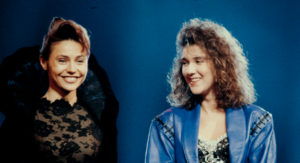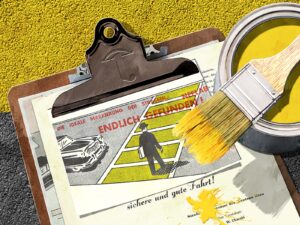
Swiss National Museum/ASL
Switzerland and Eurovision
Switzerland and Europe – it’s a love-hate relationship. At least when it comes to the Eurovision Song Contest. The event was first held in 1956, and ended with a victory for Switzerland. Since then, however, the results have been decidedly mixed.
It all started so well: in 1956, the first Grand Prix d’Eurovision in Lugano was broadcast. Lys Assia, formerly known as Rösli Schärer, from Rupperswil landed the top spot with the chanson ‘Refrain’. Switzerland won the first ever ‘Grand Prix’ – but the home victory quickly turned sour. There were claims that a slight preponderance of Swiss nationals on the jury, which at that time still judged the entries, had brought about the win. In actual fact, two Luxembourg jury members who had not been able to make the trip to Lugano for financial reasons had been quickly replaced by local judges. Just a year later Lys Assia, competing again, finished third to last. After her, there was a long dry spell until Canadian ‘hired gun’ Céline Dion won for Switzerland again in 1988, with a song by Atilla Şereftuğ (music) and Nella Martinetti (lyrics). That was it for podium finishes. From a statistical point of view, it can be said that Switzerland is one of the more successful countries: the singers representing Switzerland have finished in the top half of the table in 24 of 58 shots at the title. However, this rosy picture also includes successes dating from the Cold War.
In 1956, Switzerland won the first ‘Grand Prix d’Eurovision’ with its entrant, Lys Assia.
YouTube
In 1988, Céline Dion won. The Canadian songstress represented Switzerland with a song by Nella Martinetti.
YouTube
Researchers have established that there are three major blocks at Eurovision, local ‘islands’ of musical taste which show partisan solidarity in the voting: a Western Europe block, a Northern Europe block, and a Mediterranean block. But it seems Switzerland often falls between the blocks. It may be mere coincidence that the solid run of defeats of recent years started almost at the same time as Switzerland’s referendum on joining the EEA, but the Eurovision Song Contest has always stood for the idea of a united Europe. When Germany applied to host the event in 1957, it was only after weeks of internal consultation that the offer was accepted. The Third Reich had collapsed little more than ten years before the first ‘Grand Prix’ was organised; the idea of great empires had become a problematic one. Eurovision, in contrast, treated all nations equally – as viewers staring avidly at the box, they were united. The European Broadcasting Union, which broadcasts the song festival, isn’t interested in rigid national borders; all it cares about is audience figures. As early as the 1970s, the Eurovision Song Contest was being beamed into Asia and South America, and with Israel, Australia, and even Morocco once in 1980, joining in, the participating countries have also jumped the boundaries of the European Union. Europe, as Eurovision makes clear, is a concept with flexible borders. But journalist Jan Fedderson once noted: ‘The Eurovision Song Contest feeds on this weird dialectic that it wants us to think it’s promoting European integration and doesn’t want to exclude anyone, but then, having said that, it plays on national interests – by presenting the national flags, for example: it’s not about a song winning, it’s about a country winning.’
In 1977, Pepe Lienhard competed on an alpenhorn. While the song ‘Swiss Lady’ only made it to 6th place, the single sold very well and is still the most commercially successful entry.
YouTube
Estonian band Vanilla Ninja tried its hand in 2005 with ‘Cool Vibes’. The band took the stage on behalf of Switzerland because its manager was born here. The attempt fell short of the mark, with the song only making it to 8th place.
YouTube
Inside the space delineated by the Eurovision Song Contest, there’s a raging clash of cultures going on. Often, this has actually been promoted: for nearly 30 years, until 1999, song entries at Eurovision had to be sung in an official language. Patriotic references using alpenhorns and then-trendy yodelling popped up in Switzerland’s 1977 entry, in which a ‘man from the mountains’ waxed lyrical about his ‘Swiss Lady’. But Switzerland seems to be reasonably successful in particular when we send others to represent us. The last time we did that, Estonian band Vanilla Ninja made it into the top half of the scoreboard (the band’s manager was born in Switzerland).
The fact is that since the mid-1990s, Switzerland has been on a fast track to nowhere. The defeat of Gunvor in 1998, with her ‘nul points’ for ‘Lass ihn’, is still mentioned in the same breath as the grounding of Swissair. A few years later, Francine Jordi also fared badly – rumour has it the Euro telephone parliament wanted to punish Switzerland for the huge quantities of Nazi gold held in its vaults. But increasingly, the geopolitical justifications are wearing thin. Perhaps DJ Bobo, with his song about undead vampires who keep on picking themselves up and dusting themselves off, found the perfect song about Switzerland at Eurovision: ‘Like a nightmare, never-ending’. There’s still the old belief in magic numbers; but even if we extrapolate from the 32-year gap between Lys Assia and Céline Dion, Switzerland won’t win until 2020. Nonetheless, we wish Luca Hänni the best of luck.
Gunvor and ‘Lass ihn’ scored ‘nul points’.
YouTube
Even world-famous DJ Bobo and ‘Vampires Are Alive’ didn’t cut it. He was eliminated in the semi-finals in 2007.
YouTube
Francine Jordi, already a pop star, crashed and burned at Eurovision. With her self-penned song ‘Dans le jardin de mon âme’, she limped home in 22nd place.
YouTube



